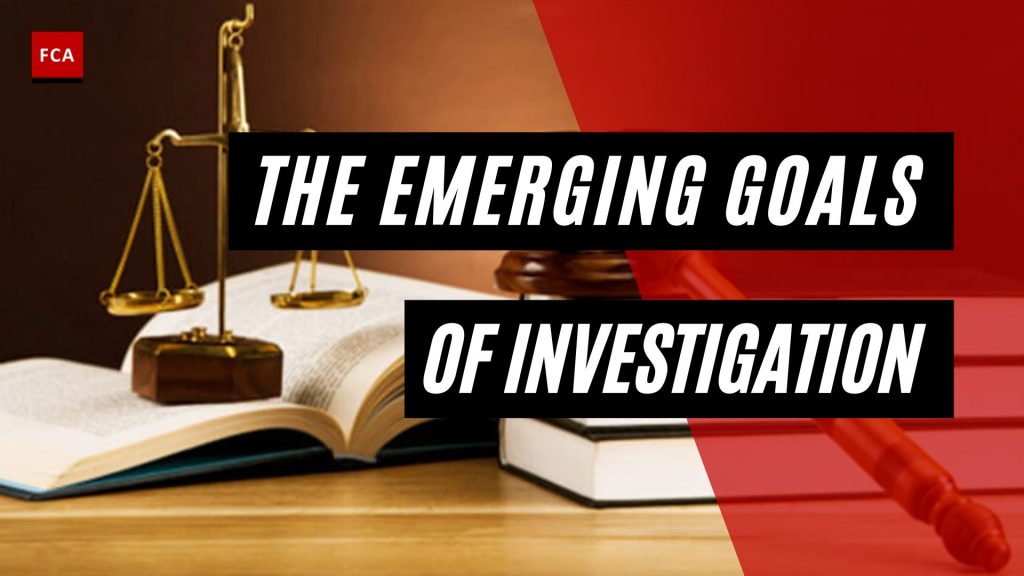The emerging goals of investigation. An internal investigation is a formal inquiry carried out by a company to determine whether laws, regulations or internal policies were violated and, if so, recommend corrective action. They are undertaken either before serious wrongdoing, when there is a substantial likelihood of policy or legal violations by the company or its employees, after potential wrongdoing, or when a company becomes aware of allegations, whether from an outside source, such as law enforcement or from inside the company, such as whistleblower claims.

The Emerging Goals Of Investigation
One key building block of the process is determining the aims of the investigation. Once these are determined, a work plan can be put into effect. The goal of any internal investigation is to get a straightforward view of the facts concerning what happened, when it happened, who was responsible, who may have been affected, and what further actions may be needed to prevent the alleged wrongdoing from reoccurring? It is a fact-finding process that is undertaken to get to the bottom of potential wrongdoing by the company itself or by an officer, director, or employee.
The core goals of all internal investigations are to:
- Uncover the truth;
- Fairly and objectively develop facts and evidence;
- Determine the extent of wrongdoing, if any;
- Assess the company’s policies, processes, and procedures;
- How to fix any problems going forward/remediate issues going backward;
- Respond to any government investigation or any lawsuit.;
- Show the company’s response was appropriate in light of the issues presented;
- Protect shareholder value damage to the company’s reputation;
- Ensure officers and directors have performed any duty owed to the company and shareholders;
- Limit the company’s exposure to lawsuits, fines, or other sanctions;
- Control the story (internally and externally);
- Ensure everyone feels they were treated fairly during the process.
What Is The Main Purpose Of Investigation?
The goal of an investigation is to gather evidence to support or refute allegations of fraud and corruption. It is a legally mandated fact-finding process that is conducted in an impartial and objective manner with the goal of establishing relevant facts and making recommendations in this regard.
The process of discovering, interpreting, and determining the validity of information in the role of a police investigator is diametrically opposed to that of everyday people, and this difference is critical. It is no longer sufficient to use strategies that ordinary people use every day as an investigator.
Instead, investigators must critically evaluate all information they come across because every investigation is an accountable process in which the investigator is not simply determining the validity and truth of the information for personal confirmation of a belief. Rather, the police investigator is responsible and legally empowered to make decisions that could have a significant impact on the lives of those being investigated as well as the victims.
What Is The Most Fundamental Purpose Of Investigation?
An investigator collects, documents, and assesses evidence and information. This is accomplished through the investigation process. The primary goal of criminal investigation and forensic science is to discover the truth.
The goal of processing a crime scene is to collect as much information and evidence as possible in as pristine a condition as possible. This includes cataloging the interrelationships of where items are in the scene, noting the physical layout of the scene, and documenting observations of things that cannot be physically observed.
What Are The Objectives Of Investigations?
Investigations determine what happened in relation to a specific incident – whether suspected conduct occurred or did not occur; what the circumstances were; who was involved; and whether a violation of law or company policy occurred.
Gathering and preserving evidence is essential in any legal matter. In civil actions, evidence assists a plaintiff in proving the extent of his or her losses in order to obtain the maximum compensation possible. Evidence is what ultimately leads to a defendant’s conviction or acquittal in criminal trials.
Final Thoughts
Investigation is a multifaceted problem-solving exercise. When an officer arrives at a crime scene, he or she is frequently required to make critical decisions, sometimes involving life and death, based on limited information in a dynamic environment of active and still evolving events.
Following the conclusion of a criminal event, the investigator is expected to preserve the crime scene, collect evidence, and devise an investigative strategy that will lead to the formation of reasonable grounds to identify and arrest the person or persons responsible for the crime. To meet these challenges, police investigators learn investigative processes such as developing investigative plans and prioritizing responses through training and experience.









